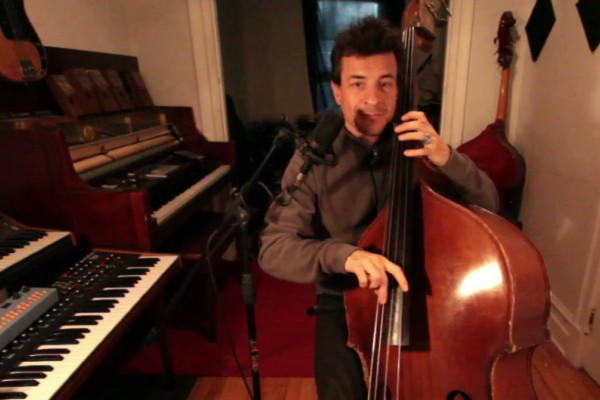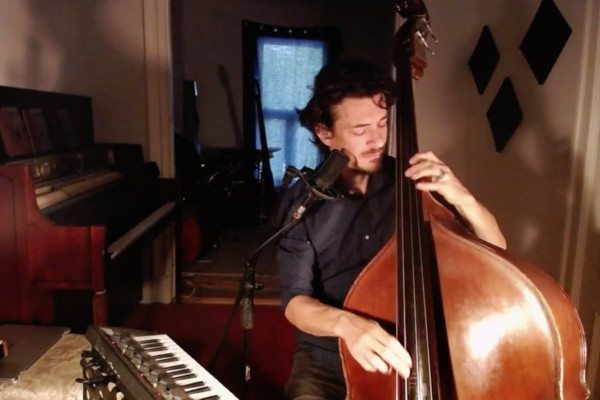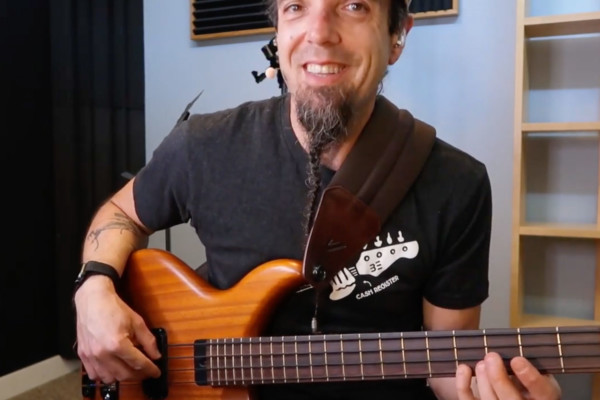Ask Damian Erskine: Melodic approach to soloing
Q: How do you approach the line between creating an interesting melody while soloing as opposed to playing chord tones and notes that harmonize better. I suppose the two blur into one really but is there a point where you worry less about the changes and more about finding an interesting melody to fit over the top and vice versa.
A: Great question! And one that is appropriately timed as this is something I’ve been working on myself these days. I am very much in the midst of this process (the beginning stages, I’d say, actually).
That is the ideal, I believe for any soloist. To play melodies over the changes that interact interestingly with those changes. Initially, most of us spend a lot of our time trying to figure out which notes work first. This led me to spend all of my time practicing arpeggios, chords and and focusing on both chord tones and non-chord tones while playing over changes. Unfortunately, the thing that I never thought to practice was playing melodies specifically. I developed speed, angular intervallic relationships, patterns, etc… but have not yet truly figured out how to simply create a beautiful melody in the moment (this is my reflection on my own playing).
I think, ultimately, that it all becomes one and we are able to hear what we want to do and ween ourselves from analyzing what we should do. This comes through a lifetime of working on every aspect of music.. Ear training, understanding harmony, knowing our instrument inside and out, practicing melody & harmony, etc…
There are so many approaches to soloing, but the guys who always stick out to me are the ones who are creating melodies (real improvised MUSIC, not just fast notes that work…) and like I said, I’m very much in the midst of changing this aspect of my playing.
This is the thing that (I believe) separates players like myself from guys like Marc Johnson, Dave Holland, Jaco, Etienne Mbappe, etc… To my ears, they have removed the barriers that lay in between both our minds and the instrument as well as between our ears and the music happening in the moment. What is required to achieve this level of musicality is a true marriage of both the instrument and music as a whole. A giving 100% of ones self to the art.
In practical terms, I believe there are many things we can do to start down the path of truly musical playing. I’ve learned a LOT from listening to, hanging out with and checking out the podcasts of Janek Gwizdala. He has a nice approach when it comes to practicing soloing, melody, etc… So I’ll basically paraphrase Janek to help answer your question for a bit (with my own thoughts here and there ;)
What I’ve begun to do is to set up a loop of a set of changes (typically diatonic, but not always) and free associate… just play. I’m focusing, tho on listening for any interesting moment that could be expanded upon. When I hear a small chunk of something I deem to be melodic fall out, I’ll immediately turn that into a motif. Wether it’s a melodic pattern, rhythmic pattern or combination of the two, I’ll move it around, twist and turn it in every direction I can think of and try and make that the foundation for everything else I play and see how I can evolve it (always listening for new motif’s, directions to turn). This has begun to help me to tune into what I’m playing and interact musically instead of jumping around always searching.
If we look at it in terms of language (I know…, but it’s true). In my opinion, ideally, I should be able to create a great story on the spot!
Right now, in my own development, I feel like I’m putting out decent sentences, but the next sentence never has that much to do with the one before it. It’s like I’m reading headline after headline, but never telling the story behind any of them. This leads me to another exercise… – Put a transcription or melody in front of you. – Loop a set of changes or pick a tune to practice to that’s different from what you’re reading! – Try and play the SHAPE of what you’re reading but not the exact notes, etc… make it fit to the music you’re actually playing! – Do this with a newspaper article, too! Try and read the article and play what you’re reading but to a set of changes!
It sounds abstract, but you’ll be amazed at how you begin to phrase in new ways!!
Also, I once asked a teacher how I could work on MELODY specifically and he just picked up a Real Book and dropped it in my lap and said, “Here’s about 500 of the best melodies ever written!”. If we want to learn to play melodically, one of the best resources we have is beautiful music! Learn, memorize, transcribe and study the APPROACH of the music. What is it that made that chorus so pretty? Turn it inside out and study it.
Also realize this! It’s not the notes that make something pretty, exactly… it has much more to do with the phrasing, articulation (or lack of) and emotion of it. HOW you play is just as important as WHAT you play. Time, feel, tone, phrasing, etc.. can make all the difference in the world.
I hope that helps!! Like I said, this is something that I’ve been struggling with in my own playing, So I can definitely tell you what I’ve been trying to do to take myself to another level with it…
Good luck!!
Have a question for Damian? Ask him!
Check out more Ask Damian Erskine columns
Have a question for Damian Erskine? Send it to [email protected]. Check out Damian’s instructional books, Right Hand Drive and The Improviser’s Path.




Good answers, Damian! What do you use for the “loop of changes” part? Looping pedal? Garageband recording?
Thanks man! I usually use a boss loopstation pedal for looping at home. Occassionally I'll record to protools if I want to tweak the levels of some of the loops or play with them in some way.
very nice and very honest answers,so bottom line we have to listen first…. and then we play, is action and reaction…. as is in life….. thanks for the good music….
very nice and very honest answers,so bottom line we have to listen first…. and then we play, is action and reaction…. as is in life….. thanks for the good music….